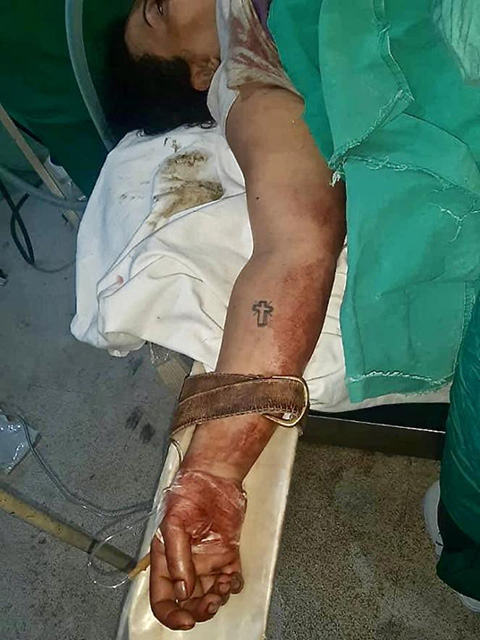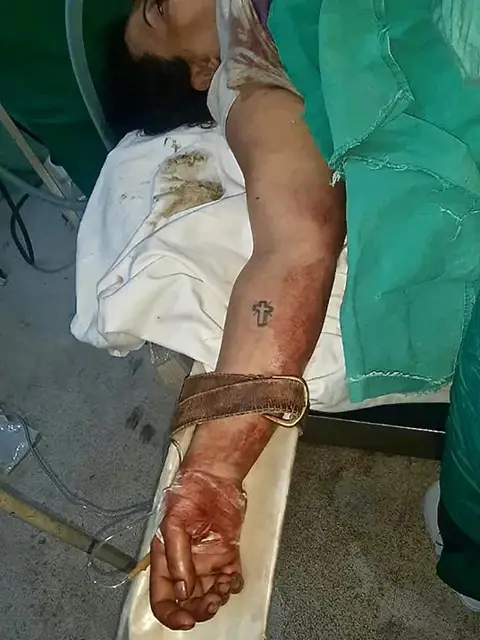NORTHEAST SYRIA (BP) – Turkish forces launched a bombing campaign across northeastern Syria on Oct. 9, targeting civilian areas and killing Syriac Christians.

The bombing campaign, launched less than 48 hours after a phone call between President Donald Trump and Turkish President Recep Tayyip Erdogan, appeared to target Christian and Kurdish enclaves in the cities of Qameshli, Kobani and others. Shelling also hit the border town of Nusaybin, in Turkey, where the oldest church in a region once dominated by the earliest Christians is located.
As the Turkish air assault began, Assyrian leader Gabriel Moshe of Qameshli told WORLD, “There are many rockets in Qameshli, and at least one girl of our people is dead.”
In the city’s Christian Quarter, known as Bashiria, shelling hit the shop and nearby home of Fadi Sabri Hasbouno. Initial reports had claimed Hasbouno, his wife, and two children were killed. WORLD received photos of the family at approximately 9 p.m. Syria time. One photo showed a woman, believed to be Hasbouno’s wife, strapped to a gurney, her arm outstretched and bloodied, a cross tattoo typical of Eastern Christians visible above an IV running from her arm. Residents later confirmed members of the whole family suffered injuries, and Hasbouno was alert while his wife underwent surgery. His shop burned and half of his house was damaged, he said.
Two children were killed and four injured between the ages of 2 and 6 years old, according to the Rojava Information Center. It said at least one hospital had been bombarded. In Qameshli, a bomb struck Mar Gorgios Assyrian Church.
Turkish airstrikes targeting residential areas violated pledges from both Erdogan and Trump, and defied UN calls to spare civilians. They caused “a huge panic among people of the region,” said Mustafa Bali, chief spokesman of the Syrian Democratic Forces (SDF).
Old people on foot, people in wheelchairs, and shepherds surrounded by their flocks all fled the Kurdish city of Ras al-Ain, reported Joan Garcia, a researcher with the Rojava Information Center.
For weeks Turkey’s Erdogan threatened an offensive at Syria’s northeastern border, where U.S. Special Forces assisted the Kurdish-led SDF in defeating ISIS. Erdogan has wanted to establish a safe zone for returning Syrian refugees in an area where approximately 100,000 Christians still live. Following a phone call between Trump and the Turkish president on Sunday, a White House press statement announced, “Turkey will soon be moving forward with its long-planned operation in Northern Syria” and U.S. forces “will no longer be in the immediate area.”
Within hours, U.S. military personnel stationed in the border towns of Tal Abiad and Ras al-Ain withdrew from their positions. Turkish troops soon moved into those areas. On Monday Turkish media published photos showing members of the Turkey-backed Syrian National Army — a collection of Syrian and other jihadist mercenaries — preparing to fight Kurds and non-Muslims. Turkish Foreign Minister Mevlüt Çavusoglu issued a statement saying his country would “clear the region from terrorists.”
The U.S. Commission on International Religious Freedom (USCIRF) issued a statement calling for a halt to Turkish airstrikes. Civilians “who represent a diverse group of religious and ethnic communities, are now at dangerous risk of falling victim to violent chaos,” said chairman Tony Perkins.
The Syrian Democratic Forces have merged militias from Kurds, Syriac Christians, and Arabs, led by the Kurdish YPG fighters. As the YPG fought ISIS in 2014 to prevent the takeover of Kobani, Turkey refused to allow U.S. jets to use the U.S. airbase at Incirlik in Turkey in support of their effort. Turkey considers the YPG an extension of the Kurdistan Workers’ Party (PKK), a group responsible for terror attacks inside Turkey.
With an ISIS victory in Kobani imminent, President Barack Obama bypassed Turkey, dropping weapons and key supplies to the Kurds in Kobani, and later providing air cover in the fight. The YPG and later SDF proved successful at routing ISIS across northern Syria, including the Christian villages held by ISIS along the Khabur River, and in Raqqa, the capital of the ISIS “caliphate.”
In all, the SDF has lost 11,000 fighters in these combat operations.
On Oct. 8, Genocide Watch renewed a 2018 genocide warning for northeast Syria, saying, “Kurds, Christians, and Yezidis in Northeast Syria are at grave risk of genocide by the armies of Turkey and Syria.”
The Syriac Union Party, an opposition party led by Christians from the north’s Hasakah region, released a statement condemning Turkish attacks, and warning that the existence of Syriac Christians and other Christian communities in northeast Syria is now in danger.
The International Mission Board (IMB) asked Southern Baptists to pray. Senior global leaders provided the following guidance for prayers, said Julie McGowan, IMB’s public relations manager:
– For the peace and provision for needs of those people affected by recent developments;
– For God to use this situation to open Gospel conversations among people as they consider the future.
Written by Mindy Belz of WORLD Magazine, with contributions by the staff of the International Mission Board. Distributed by Baptist Press, the official news service of the Southern Baptist Convention.

